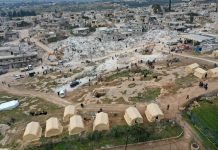The impact of earthquakes that struck Turkey and Syria on February 6 will be felt for months and years to come, UN World Food Programme (WFP) Executive Director David Beasley said on Saturday.
“There is only one way to describe what I saw today: apocalyptic,” Beasley said following his visit to the southern Turkish province of Hatay, one of the areas hardest hit by the earthquakes. “Entire neighborhoods have been flattened, homes destroyed, schools and shops closed, lives torn apart. The scale of devastation here is truly incomprehensible.”
A 7.8-magnitude earthquake that struck near the Turkish city of Gaziantep – home to around 2 million people and on the border with Syria – as people were sleeping on February 6 was followed by dozens of aftershocks, including a 7.5-magnitude temblor that jolted the region in the middle of search and rescue efforts the same day.
The UN launched a $1 billion funding appeal to support millions of people in Turkey.
UN Secretary-General Antonio Guterres earlier said in a statement that the funds would provide humanitarian relief for three months to 5.2 million people. The money would “allow aid organizations to rapidly scale up vital support,” including in the areas of food security, protection, education, water and shelter, he added.
On the Syrian side of the border, Beasley described the situation as a “catastrophe on top of a catastrophe.”
Since the border crossing re-opened on February 13, WFP has supported the crossing of 180 trucks into northwest Syria. While welcoming the recent re-opening of vital supply routes, he underlined the need to resume and scale up crossline deliveries. In this regard, he called on all parties to further facilitate access.
UN humanitarian agencies will need $397.6 million in funding over the next three months to respond to the most pressing humanitarian needs of 4.9 million people in Syria who have been affected by the quakes, the Office for the Coordination of Humanitarian Affairs (OCHA) said in a statement.














